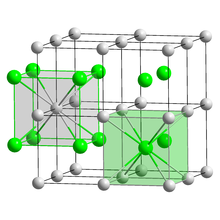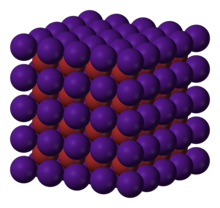This is the current revision of this page, as edited by Citation bot (talk | contribs) at 20:49, 12 May 2024 (Added bibcode. | Use this bot. Report bugs. | Suggested by Whoop whoop pull up | Category:Caesium compounds | #UCB_Category 8/47). The present address (URL) is a permanent link to this version.
Revision as of 20:49, 12 May 2024 by Citation bot (talk | contribs) (Added bibcode. | Use this bot. Report bugs. | Suggested by Whoop whoop pull up | Category:Caesium compounds | #UCB_Category 8/47)(diff) ← Previous revision | Latest revision (diff) | Newer revision → (diff) | |
 | |
| Names | |
|---|---|
| IUPAC name Cesium bromide | |
| Other names
Cesium bromide, Caesium(I) bromide | |
| Identifiers | |
| CAS Number | |
| 3D model (JSmol) | |
| ChemSpider | |
| ECHA InfoCard | 100.029.209 |
| EC Number |
|
| PubChem CID | |
| RTECS number |
|
| UNII | |
| CompTox Dashboard (EPA) | |
InChI
| |
SMILES
| |
| Properties | |
| Chemical formula | CsBr |
| Molar mass | 212.809 g/mol |
| Appearance | White solid |
| Density | 4.43 g/cm |
| Melting point | 636 °C (1,177 °F; 909 K) |
| Boiling point | 1,300 °C (2,370 °F; 1,570 K) |
| Solubility in water | 1230 g/L (25 °C) Disputed.
420 g/L (11 °C) See References |
| Magnetic susceptibility (χ) | -67.2·10 cm/mol |
| Refractive index (nD) | 1.8047 (0.3 μm) 1.6974 (0.59 μm) 1.6861 (0.75 μm) 1.6784 (1 μm) 1.6678 (5 μm) 1.6439 (20 μm) |
| Structure | |
| Crystal structure | CsCl, cP2 |
| Space group | Pm3m, No. 221 |
| Lattice constant | a = 0.4291 nm |
| Lattice volume (V) | 0.0790 nm |
| Formula units (Z) | 1 |
| Coordination geometry | Cubic (Cs) Cubic (Br) |
| Hazards | |
| GHS labelling: | |
| Pictograms | 
|
| Signal word | Warning |
| Hazard statements | H302, H315, H319, H335 |
| Precautionary statements | P261, P264, P270, P271, P280, P301+P312, P302+P352, P304+P340, P305+P351+P338, P312, P321, P330, P332+P313, P337+P313, P362, P403+P233, P405, P501 |
| NFPA 704 (fire diamond) |
 |
| Flash point | Non-flammable |
| Lethal dose or concentration (LD, LC): | |
| LD50 (median dose) | 1400 mg/kg (oral, rat) |
| Related compounds | |
| Other anions | Caesium fluoride Caesium chloride Caesium iodide Caesium astatide |
| Other cations | Sodium bromide Potassium bromide Rubidium bromide Francium bromide |
| Except where otherwise noted, data are given for materials in their standard state (at 25 °C , 100 kPa).
| |
Caesium bromide or cesium bromide is an ionic compound of caesium and bromine with the chemical formula CsBr. It is a white or transparent solid with melting point at 636 °C that readily dissolves in water. Its bulk crystals have the cubic CsCl structure, but the structure changes to the rocksalt type in nanometer-thin film grown on mica, LiF, KBr or NaCl substrates.
Synthesis
Caesium bromide can be prepared via following reactions:
- CsOH (aq) + HBr (aq) → CsBr (aq) + H2O (l)
- Cs2(CO3) (aq) + 2 HBr (aq) → 2 CsBr (aq) + H2O (l) + CO2 (g)
- Direct synthesis:
- 2 Cs (s) + Br2 (g) → 2 CsBr (s)
The direct synthesis is a vigorous reaction of caesium with bromine. Due to its high cost, it is not used for preparation.
Uses
Caesium bromide is sometimes used in optics as a beamsplitter component in wide-band spectrophotometers.
References
- ^ Haynes, p. 4.57
- Haynes, p. 4.132
- Haynes, p. 10.240
- Vallin, J.; Beckman, O.; Salama, K. (1964). "Elastic Constants of CsBr and CsI from 4.2K to Room Temperature". Journal of Applied Physics. 35 (4): 1222. Bibcode:1964JAP....35.1222V. doi:10.1063/1.1713597.
- Caesium bromide. nlm.nih.gov
- Schulz, L. G. (1951). "Polymorphism of cesium and thallium halides". Acta Crystallographica. 4 (6): 487–489. Bibcode:1951AcCry...4..487S. doi:10.1107/S0365110X51001641.
* Crystran Ltd experimental data July 2021 Archived 2012-12-18 at the Wayback Machine
Cited sources
- Haynes, William M., ed. (2011). CRC Handbook of Chemistry and Physics (92nd ed.). Boca Raton, Florida: CRC Press. ISBN 1-4398-5511-0.
External links
- MSDS at Oxford University Archived 2007-10-17 at the Wayback Machine
- Crystran Physical data Archived 2012-12-18 at the Wayback Machine, IR transmission spectrum
- Ultra-violet photoabsorption measurements in alkali iodide and caesium bromide evaporated films
| Caesium compounds | |
|---|---|
| Salts and covalent derivatives of the bromide ion | ||||||||||||||||||||||||||||||||||||||||||||||||||||||||||||||||||||||||||||||||||||||||||||||||||||||||||||||||||||||||||||||||||||||||||||||||||||||||||||||||||||
|---|---|---|---|---|---|---|---|---|---|---|---|---|---|---|---|---|---|---|---|---|---|---|---|---|---|---|---|---|---|---|---|---|---|---|---|---|---|---|---|---|---|---|---|---|---|---|---|---|---|---|---|---|---|---|---|---|---|---|---|---|---|---|---|---|---|---|---|---|---|---|---|---|---|---|---|---|---|---|---|---|---|---|---|---|---|---|---|---|---|---|---|---|---|---|---|---|---|---|---|---|---|---|---|---|---|---|---|---|---|---|---|---|---|---|---|---|---|---|---|---|---|---|---|---|---|---|---|---|---|---|---|---|---|---|---|---|---|---|---|---|---|---|---|---|---|---|---|---|---|---|---|---|---|---|---|---|---|---|---|---|---|---|---|---|
| ||||||||||||||||||||||||||||||||||||||||||||||||||||||||||||||||||||||||||||||||||||||||||||||||||||||||||||||||||||||||||||||||||||||||||||||||||||||||||||||||||||